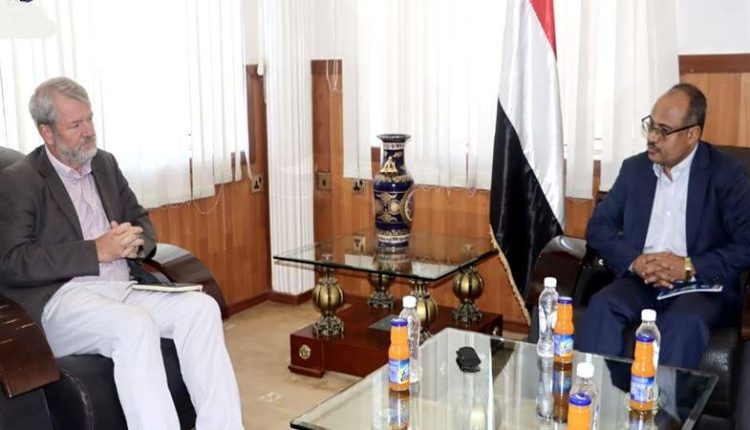Minister of Justice Urges UNICEF to Mitigate the Negative Impact of US-Saudi Aggression on Yemeni Children
The Minister of Justice and Human Rights, Mujahid Ahmed Abdullah, has called on UNICEF to intensify its efforts to alleviate the negative impact of the aggression on Yemeni children.
This appeal was made during his meeting on Tuesday with UNICEF Resident Representative Peter Hawkins in the capital, Sana’a. The discussion focused on ways to enhance cooperation and coordination between the ministry and the organization in areas related to child justice to ensure the best interests of children.
During the meeting, the Minister of Justice and Human Rights reviewed the situation of children in Yemen, highlighting the crimes and violations of their rights due to the unjust aggression and severe blockade on the country. He emphasized the importance of UNICEF’s continued involvement in the field of child justice.
The Minister underscored the importance of supporting the technical committee’s plan for child justice for the current year, particularly regarding the infrastructure of juvenile justice, continued support for legal aid, and judicial awareness. He noted that protecting children can reduce delinquency by 50 percent.
The Minister also expressed his ministry’s readiness to support UNICEF’s efforts in human rights and child protection within the framework of national laws.
For his part, the UNICEF Resident Representative emphasized the organization’s commitment to providing necessary support for child protection in partnership with the Ministry of Justice and Human Rights, which leads the technical committee for child justice. He reaffirmed UNICEF’s dedication to achieving shared goals with the ministry in enhancing child justice and protecting children’s rights.
Saudi Arabia, backed by the United States and regional allies, launched the war on Yemen in March 2015, claiming the goal of bringing the government of former Yemeni president Abd Rabbuh Mansour Hadi back to power.
A report by the Organization for Women and Children’s Rights (Entisaf) reported that Yemen records the highest child mortality rates in the Middle East, during the years of aggression and siege, with about 60 children dying out of every 1,000 births, in addition to the death of 52,000 children annually, which means the death of a child every ten minutes.
The blockade led to an increase in malnutrition rates, which rose over the past two years to six million people, from 3.6 million, an increase of 66 percent.
At least two million and 400 thousand children are out of school out of an estimated 10.6 million children of school age, from 6 to 17 years.
12.6 million children need some form of humanitarian assistance or protection, while poverty rates are estimated to rise to about 80 percent.
More than 2.3 million children under the age of five were registered suffering from malnutrition, and 632,000 children suffered from life-threatening malnutrition during the year.

